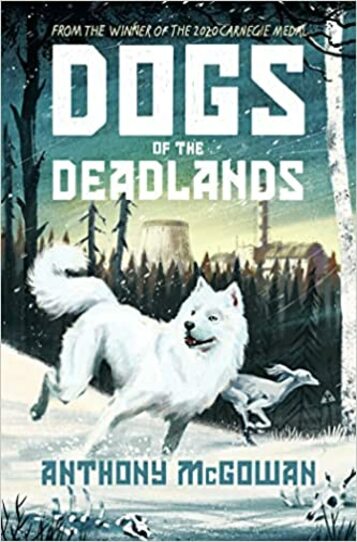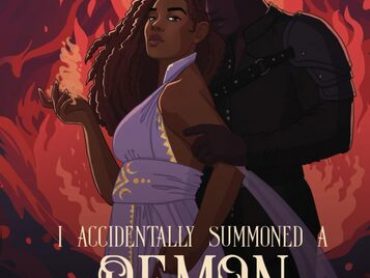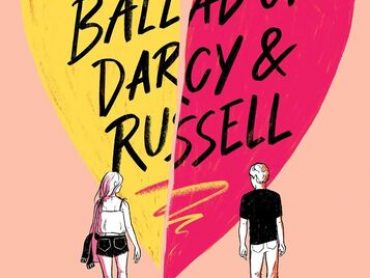Anthony McGowan is the author of Dogs of The Deadlands. Dogs of The Deadlands explores a time that humans fled the nuclear disaster, they were forced to leave their pets behind. It follows Zoya, and her pups Misha and Luka. Can they learn to survive in the deadlands? And will Zoya ever find her way home to her beloved owner? YEM was able to speak with Anthony about what his writing process is like, what he loves most about writing for young adults, and if he is thinking of writing any more books in the future that involve dogs or animals of any kind.
Young Entertainment Mag: When did you realize that writing was something that you wanted to do?
Anthony McGowan: As a kid, I was big reader, and for me writing is essentially an extension of reading. By my late teens I knew that writing was going to be part of my life, although at that stage I had no idea how big a part. At school I got in a positive feedback loop, getting praised for writing essays and stories, and using that praise as a springboard to improve. But for a long time I assumed I’d have another ‘real’ job while I wrote in my spare time.
YEM: Your book Dogs of The Deadlands is coming out, what can you tell us about it?
Anthony: The Dogs of the Dead Lands is an adventure story set in the forests and abandoned farms around the former Chernobyl nuclear plant, in Ukraine. The families evacuated after the 1986 disaster weren’t allowed to take their pet dogs with them. Although the army returned to try to kill all the dogs, many escaped, and began to live wild in the now deserted – but heavily contaminated – forests.
Without people, nature began to return to the woods: lynx and bear and, most successfully, wolves. Wolves and feral dogs have a complex relationship. In general, the wolves kill and eat the dogs. But not always …
Dogs of the Dead Lands tells the story of a dog growing up in this perilous and beautiful world. It is in the classic tradition of Jack London’s Call of the Wild and Henry Williamson’s Tarka the Otter, with a dose of Watership Down thrown in. It is an animal adventure story but also a human tale of love, tragedy and redemption.
YEM: Where did the inspiration for writing about dogs surviving without their owners come from?
Anthony: It was inspired by real events. I remember when the Chernobyl disaster happened (I was at university at the time), but only found out about the ecological aspects much later, when I watched a National Geographic documentary about the return of the wolves. And then I read an article about the feral dogs, descendants of those left behind. By that stage the only survivors would hang around the nuclear plant, parts of which were, amazingly, still operating right up until 2000. The surviving dogs were (and are) a rather sad lot, but I imagined a more exciting early life for one old dog, and that was the basis of my story.
YEM: Who is an author that inspires you?
Anthony: For this book Jack London was a huge inspiration. I’d read Call of the Wild and White Fang as a kid, and then reread them as research for this project, and I was just stunned by how great they were. Brutal and honest, but also truly exciting. I‘ve also channelled a bit of Cormac McCarthy – his poetry-infused ferocity.
YEM: What was your writing process like?
Anthony: I wrote most of this book in the British Library, in London. It’s a wonderful place to work. There are these huge and beautiful reading rooms, with just the right combination of quietness and scholarly activity. And this book involved a lot of research – I read every single available academic paper on feral dogs and wolves, so it was great having that all on hand. In general, I don’t plan much: I just have the idea in my head, and write from the beginning to the end.
YEM: How long was the writing process for this book?
Anthony: I’m usually a rapid writer, and my first draft is also pretty close to what gets published, but Dogs of the Deadlands was quite slow and tortuous. The trouble was that some of the best parts of my first draft didn’t quite fit with the rest of the story. There were long sections set in the second world war, and also the Afghan conflict, and although I thought they were among the best things I’ve ever written, they had to go. So there was quite a lot of back and forth with my patent and diligent editor! The whole process took a couple of years.
YEM: Your book is a story about courage, companionship, and hope as well. Did you start writing it knowing you wanted that to be a big part of the story?
Anthony: My main job was to tell a gripping adventure story. I really wanted the reader to have that urgency, that feeling that they couldn’t turn the pages fast enough. But adding an emotional layer adds greatly to the investment the reader feels in the characters (animal and human), and so adds also to the excitement as you read. The more you love the characters, the more you care about what happens. And at the centre of the book is the bond between the two canine brothers, Misha and Bratan, and I think that relationship carried a big emotional punch. But also there’s a link between my main human character, Natasha, who begins as a young girl, and her puppy – a puppy she loses forever, but never forgets …
YEM: What is some advice you have for someone who also wants to be a writer?
Anthony: Firstly, steep yourself in literature. Writers are infinitely various, eccentric in endless ways, but they all have this in common: they begin as readers. Secondly, if you’re a writer you’ll have dozens of ideas every day – snatches of dialogue, characters, plots, descriptions, metaphors… So, never be without a notebook to write them down. Third, write every day, even if it’s just for five minutes. Everyone is busy, but no life is without a dead five minutes, or half hour, or hour. We all waste so much time scrolling through social media posts – just use some of that to create.
YEM: What is one thing that you hope your readers will take away from reading Dogs of The Deadlands?
Anthony: I want the readers first of all to be entertained and moved. And secondly to feel that these things might have happened (so I wanted to generate a feeling of authenticity, and truth). And thirdly to recognise the beauty and fragility of the natural world.
YEM: What do you love most about writing for young adults?
Anthony: Young adults read with an extraordinary intensity. When they love a book, they really love a book. It makes them a very rewarding – but also demanding audience. If you don’t hit the spot, they’ll cast you aside.
YEM: Is there a specific line in the book that is your favorite or you are most proud of?
Anthony: It’s very hard to pull a line out from a text – everything is connected… But the end of the book I think is quite moving. If you know what has gone before …
“Now, my love, my darling,” the girl said, “we must sleep, because tomorrow I have to teach you all the tricks.” And he bathed in her love and melted at last into the warmth like a snowflake on the tongue.
YEM: Are you thinking of writing any more books in the future that involve dogs or animals of any kind?
Anthony: Yes! My new book is about two teenagers trying to transport a small herd of white horses from one end of a country to the other. The setting is almost post-apocalyptic, but could be Russia after the First World War, or the American west, or some time in the future. It’s another adventure story, but marbled with tragedy.
YEM: Favorite quote from the book?
Anthony: I don’t really have a particular favourite, but I quite like this scene – my family of dogs, Misha, Bratan, and Mother, have been stalked by a lynx.
The lynx was moving slowly all the time, calmly circling. His orange eyes held them, and Misha was filled with a sense of weakness, of helplessness. The eyes of the lynx drew away his strength. With each slow step he felt less like the almost full-grown dog he was and more like a defenceless puppy. But something in him still wanted to fight, to stand together with Mother, their teeth against the world.





